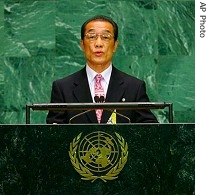-
(单词翻译:双击或拖选)
By Peter Heinlein
United Nations
26 September 2006
A top North Korean official has ruled out a return to six-party talks on its nuclear program, and accused the United States of trying to rule the world.

North Korean deputy FM Choe Su Hon at UN
The verbal broadside came during North Korea's annual address to the U.N. General Assembly.
North Korea's deputy foreign minister, Choe Su Hon, blamed what he called the "vicious, hostile policies" of the United States for what he called "touch and go critical tension on the Korean peninsula." Referring to his country by its initials DPRK, Choe said Washington is purposely stoking tensions in a strategy aimed at world domination. "The United States aims to strengthen its armed forces in this region, and thus contain the ever-growing-strong DPRK and neighboring countries within its world supremacy1 strategy. This is what the real intention of the United States is," he said.
He accused the United States of imposing2 unjustified financial sanctions on Pyongyang, and said under such conditions, North Korea would not return to the stalled six-party talks on its nuclear program. "It is quite preposterous3 that the DPRK, under the groundless U.S. sanctions, takes part in the talks of discussing its own nuclear abandonment. This is the matter of principle which cannot tolerate even the slightest concession," he said.
Earlier in the day, the U.S. ambassador to South Korea, Alexander Vershbow, said Washington is prepared to have high-level one-on-one talks with North Korea if Pyongyang returns to the six-party talks. He offered to send Assistant Secretary of State Christopher Hill to Pyongyang for the meeting.
Hill is the chief U.S. delegate to the six-party talks. In the past, the United States had said bilateral4 meetings could only be held in the context of the nuclear talks.
Washington imposed sanctions on Pyongyang a year ago because of North Korea's alleged5 involvement in counterfeiting6 U.S. currency. North Korea responded by calling off the six-party talks, which also involved China, Japan, Russia and South Korea.
Pyongyang declared itself a nuclear weapons state in February of 2005, but has not conducted any tests. It defied international warnings this year by carrying out ballistic missile tests of rockets believed capable of reaching the United States.
The U.N. Security Council reacted with a resolution condemning7 the tests, and imposing weapons-related sanctions. But North Korea rejected the resolution, and vowed8 to continue its missile program.
 收听单词发音
收听单词发音
1
supremacy

|
|
| n.至上;至高权力 | |
参考例句: |
|
|
|
2
imposing

|
|
| adj.使人难忘的,壮丽的,堂皇的,雄伟的 | |
参考例句: |
|
|
|
3
preposterous

|
|
| adj.荒谬的,可笑的 | |
参考例句: |
|
|
|
4
bilateral

|
|
| adj.双方的,两边的,两侧的 | |
参考例句: |
|
|
|
5
alleged

|
|
| a.被指控的,嫌疑的 | |
参考例句: |
|
|
|
6
counterfeiting

|
|
| n.伪造v.仿制,造假( counterfeit的现在分词 ) | |
参考例句: |
|
|
|
7
condemning

|
|
| v.(通常因道义上的原因而)谴责( condemn的现在分词 );宣判;宣布…不能使用;迫使…陷于不幸的境地 | |
参考例句: |
|
|
|
8
vowed

|
|
| 起誓,发誓(vow的过去式与过去分词形式) | |
参考例句: |
|
|
|















